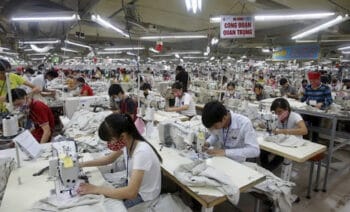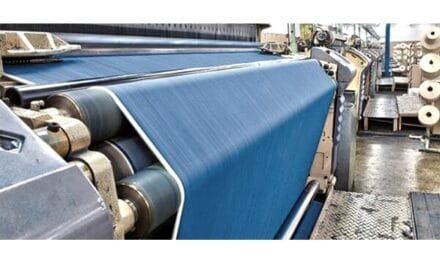 The International Labor Organization (ILO) recently signed an agreement with the Dutch Government on a new project to anticipate and address future skills needs in Vietnam’s clothing sector. According to the Ministry of Trade and Trade, Vietnam’s textile and garment industry employs about 2.7 mn people.
The International Labor Organization (ILO) recently signed an agreement with the Dutch Government on a new project to anticipate and address future skills needs in Vietnam’s clothing sector. According to the Ministry of Trade and Trade, Vietnam’s textile and garment industry employs about 2.7 mn people.
According to the latest report from the Vietnam Textile and Apparel Association, the textile and garment industry is estimated to reach the export revenue target of $ 39 bn this year, which is equal to the 2019 figure. However, the COVID-19 crisis has hit the industry hard. In addition to factory closures and loss of revenue, the pandemic has transformed textile and garment production, accelerating major functioning drivers and megatrends. These include automation and digitization, as well as the introduction of cleaner, more environmentally friendly production to mitigate climate change.
The International Labor Organization (ILO) recently signed an agreement with the Dutch Government on a new project to anticipate and address future skills needs in Vietnam’s clothing sector. According to the Ministry of Trade and Trade, Vietnam’s textile and garment industry employs about 2.7 mn people.
The ILO will help Vietnamese Governments, employers and workers’ organizations understand the industry and the skills its workers need now and in the future as part of a new two-year project beginning in January 2022. To do. This project focuses on the COVID-19 crisis and those at greatest risk of losing their jobs as a result of increased automation and digitalization in the industry. This is an important step in building a more resilient, inclusive and sustainable industry with decent work opportunities for more women and men.
“Timely investment in skills reduces the impact of career scars from speeding up economic recovery, safe return to work, long-term unemployment and skill mismatches, and offers opportunities that can be lost over time. It will help you to take advantage of it. ” ILO Vietnam Officer, Nilim Balua Said in a statement.
The Netherlands believes that a sustainable textile value chain is a prerequisite for a healthy recovery from the effects of COVID-19.
“Sustainable business models, including employability and skills development, contribute to a variety of current and future challenges for the industry,” he said. Elsbeth Ackermann, Ambassador of the Kingdom of the Netherlands. “With this project, we are proud to take the next step towards future evidence and the sustainable textile and garment sector.”
The new project is based on the ILO’s 100th Anniversary Declaration on Future Work (2019), the ILO’s Call for Global Action for Human-Centered Restoration (2021), and a recent resolution of the International Labor Conference on Skills and Lifelong Learning. I am being guided. Apply lessons learned from similar ILO Skills Prediction projects in the ILO Skills Sector in Brazil, Ethiopia, Jordan and Peru and build on the outcomes of past ILO Skills Development programs in Vietnam.
This project will be carried out in close cooperation with the IFC-ILO Betterwork Vietnam Program, and the findings and results in Vietnam will be shared with other ILO member countries through the creation of a regional knowledge platform on future skills needs of textiles. Increase. And clothing from the Asia Pacific region.






















